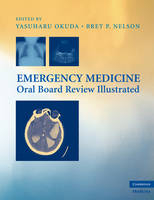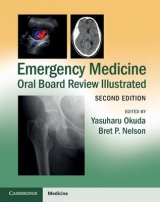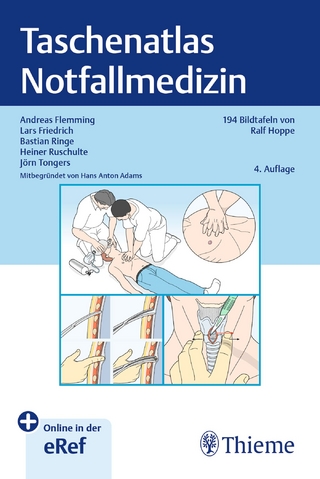
Emergency Medicine Oral Board Review Illustrated
Cambridge University Press (Verlag)
978-0-521-89639-9 (ISBN)
- Titel erscheint in neuer Auflage
- Artikel merken
The accreditation process for emergency medicine in the United States is considered one of the most difficult among all medical specialties, with residents required to pass both a written and oral examination to gain certification. This book allows the reader to apply a case-based interactive approach to studying for the oral board examination, while also providing an excellent introduction to the field. Featuring more than 100 cases derived from the Model of Clinical Practice of Emergency Medicine, with an emphasis on EKGs, CT scans, X-rays, and ultrasounds, this book is a model resource for the practising emergency medicine resident. The reader can easily practise cases alone or with a partner and can follow up with key points of critical actions, clinical pearls, and references. The appendix is loaded with high-yield information on subjects emphasized in the oral board examination, such as pediatric, cardiovascular, traumatic, and toxicologic disorders. This book truly allows the reader to feel actively immersed in the case.
Yasuharu Okuda, MD, is Assistant Professor in the Departments of Emergency Medicine and Medical Education, Co-Director of the Center for Quality, Education, and Public Safety through Simulation, and Director of Medical Student Simulation at the Mount Sinai School of Medicine, New York. Dr Okuda received his medical degree from New York Medical College and completed his emergency medicine residency at the Mount Sinai Hospital as Chief Resident. Dr Bret Nelson has lectured on ultrasound throughout the United States, Europe, and Asia. He is co-author of the Manual of Emergency and Critical Care Ultrasound (Cambridge University Press). He is a member of the national faculty of the Sonoran ultrasound course, The Difficult Airway Course, the international faculty of WINFOCUS, and has led a number of CME conferences on basic and advanced ultrasound. He has earned teaching awards from Harvard Medical School and Mount Sinai School of Medicine and was named Attending of the Year by the Mount Sinai Emergency Medicine residents. The Mount Sinai Institute for Medical Education recently selected him as a Master Educator level member.
Introduction I. How to use this book; Introduction II. Medical decision-making; Introduction III. About the Oral Boards: the approach and practical tips; Cases by Diagnosis: 1. Iron overdose; 2. Congenital hypertrophic pyloric stenosis; 3. Hemorrhagic stroke; 4. Tension pneumothorax; 5. Cholecystitis; 6. Septic shock – infant; 7. Boerhaave's Syndrome; 8. Epidural abscess; 9. Necrotizing fasciitis; 10. Hyperkalemia; 11. Acute angle closure glaucoma; 12. Hernia with obstruction; 13. Aspirin overdose; 14. Henoch-Schonlein Purpura; 15. Snake bite; 16. Retinal vascular occlusion; 17. Child with dysrhythmias; 18. Retropharyngeal abscess; 19. Slipped capital femoral epiphysis; 20. Testicular torsion; 21. Peptic ulcer disease with perforation; 22. Pertussis; 23. Abdominal aortic aneurysm; 24. Carbon monoxide poisoning; 25. Facial fracture; 26. Thermal burn 30%; 27. Variceal bleed; 28. Symptomatic bradycardia; 29. Asthma exacerbation; 30. Steven's Johnson syndrome; 31. Guillain-Barre syndrome; 32. Small bowel obstruction; 33. Cocaine chest pain; 34. Febrile seizure; 35. Pulmonary embolism; 36. Anaphylaxis; 37. Appendicitis; 38. Subdural hematoma; 39. Perirectal abscess; 40. Ectopic pregnancy; 41. Disruptive patient; 42. Diabetic ketoacidosis; 43. Inferior wall myocardial infarction; 44. Ovarian torsion; 45. Opioid overdose; 46. Traveler's diarrhea; 47. Thrombotic thrombocytopenic purpura; 48. Ludwig's angina; 49. Pericardial tamponade; 50. Cat bite; 51.Tubo-ovarian abscess; 52. Cavernous sinus thrombosis; 53. Kawasaki's syndrome; 54. Cauda equina; 55. Sudden infant death syndrome; 56. Septic joint; 57. Rocky Mountain spotted fever; 58. Sickle cell disease – acute chest; 59. Bacterial meningitis; 60. Pericarditis; 61. Hypoglycemia; 62. High altitude cerebral edema; 63. Digitalis overdose; 64. Congestive heart failure; 65. Congenital heart disease; 66. Renal colic; 67. Status epilepticus; 68. Fournier's gangrene; 69. Intussusception; 70. HIV – fever; 71. Superventricular tachycardia; 72. Bacterial pneumonia; 73. Neck trauma; 74. Pancreatitis; 75. Ischemic bowel; 76. Chronic obstructive pulmonary disease; 77. Alcohol withdrawal; 78. Ischemic stroke; 79. Pelvic fracture; 80. Pyelonephritis; 81. Thyroid storm; 82. Childhood trauma – abuse; 83. Hemolytic-uremia syndrome; 84. Foreign body airway; 85. Acetaminophen overdose; 86. Lateral wall myocardial infarction; 87. Systemic inflammatory response syndrome; 88. Heatstroke; 89. Pericardial tamponade; 90. Tension pneumothorax; 91. Diverticulitis; 92. Eclampsia; 93. Ventricular tachycardia; 94. Tricyclic antidepressant overdose; 95. Transplant – fever; 96. Splenic injury; 97. Necrotizing enterocolitis; 98. Cirrhosis with spontaneous bacterial peritonitis; 99. Anthrax pulmonary; 100. Hypertensive emergency; 101. Cold water immersion; 102. Congenital coarctation; 103. Enteroinvasive diarrhea; 104. Pneumocystis pneumonia; 105. Isoniazid overdose; 106. Elder abuse; 107. Gout; 108. Carotid artery dissection; 109. Volvulus; Appendices: 1. The chest pain patient: five life-threatening causes and critical actions; 2. The confused patient: ten most common causes and critical actions; 3. The poisoned patient: most common toxidromes and treatments; 4. The trauma patient: the approach and important principles; 5. Advanced cardiac life support review; 6. Pediatric pearls: high yield facts from fever to drugs; 7. Twenty common emergency medicine procedures: indications, contraindications, technique and complications.
| Erscheint lt. Verlag | 17.8.2009 |
|---|---|
| Zusatzinfo | 110 Tables, unspecified; 1 Plates, color; 213 Halftones, unspecified; 75 Line drawings, unspecified |
| Verlagsort | Cambridge |
| Sprache | englisch |
| Maße | 215 x 278 mm |
| Gewicht | 1600 g |
| Themenwelt | Medizin / Pharmazie ► Gesundheitsfachberufe ► Rettungsassistent / -sanitäter |
| Medizin / Pharmazie ► Medizinische Fachgebiete ► Notfallmedizin | |
| Medizin / Pharmazie ► Pflege | |
| ISBN-10 | 0-521-89639-8 / 0521896398 |
| ISBN-13 | 978-0-521-89639-9 / 9780521896399 |
| Zustand | Neuware |
| Haben Sie eine Frage zum Produkt? |
aus dem Bereich



